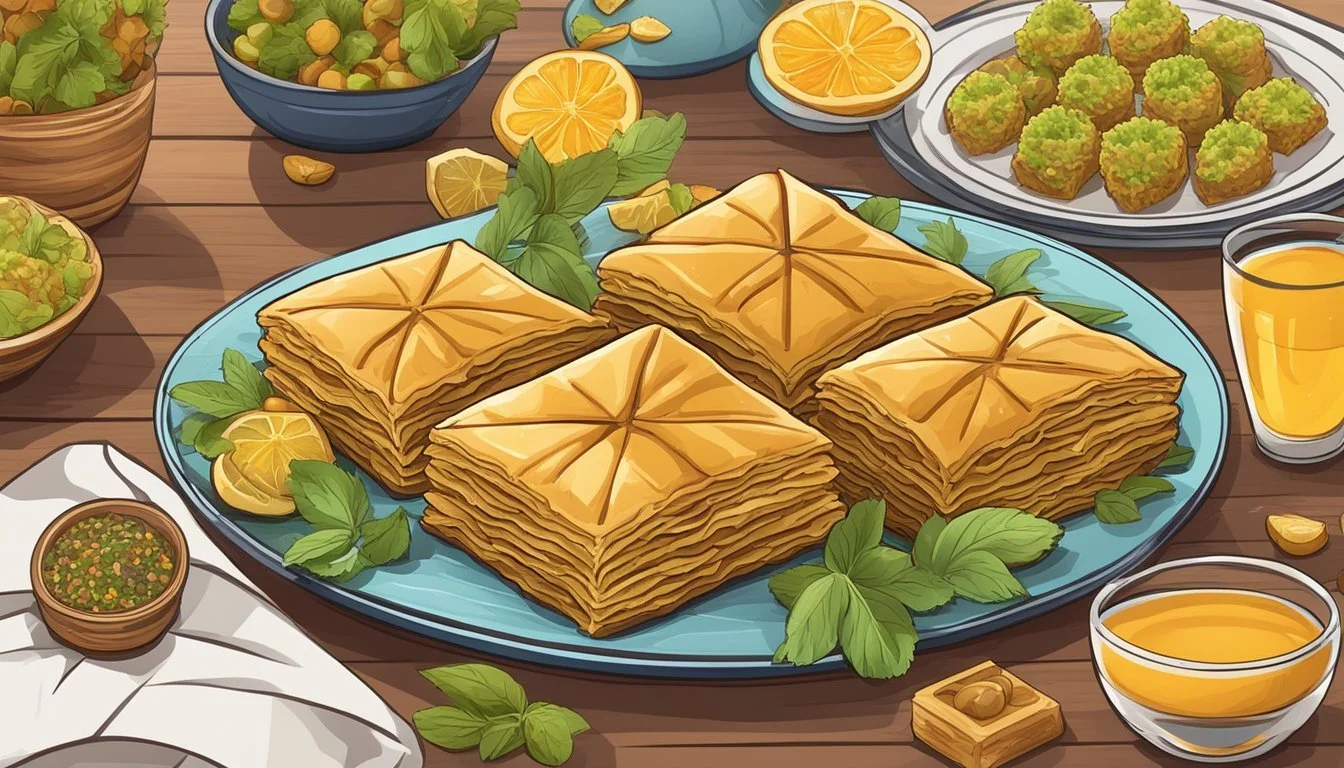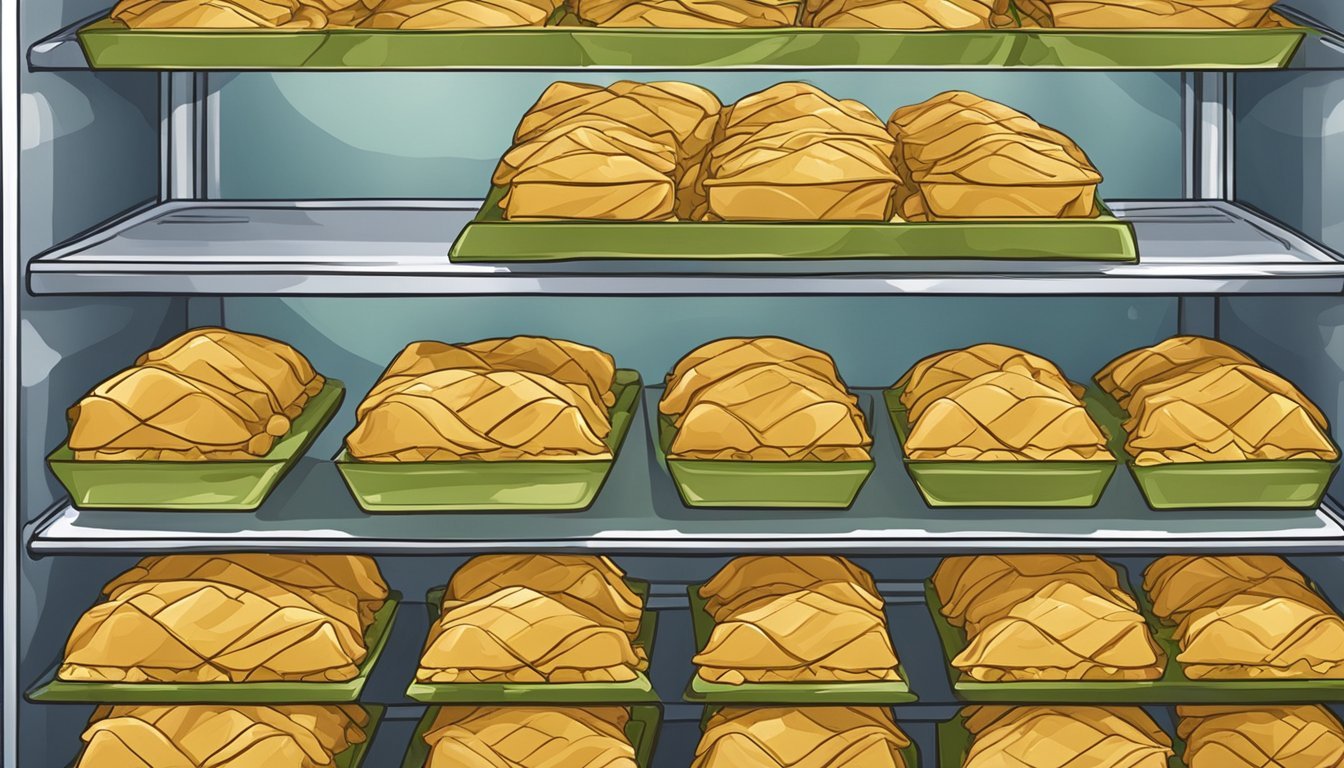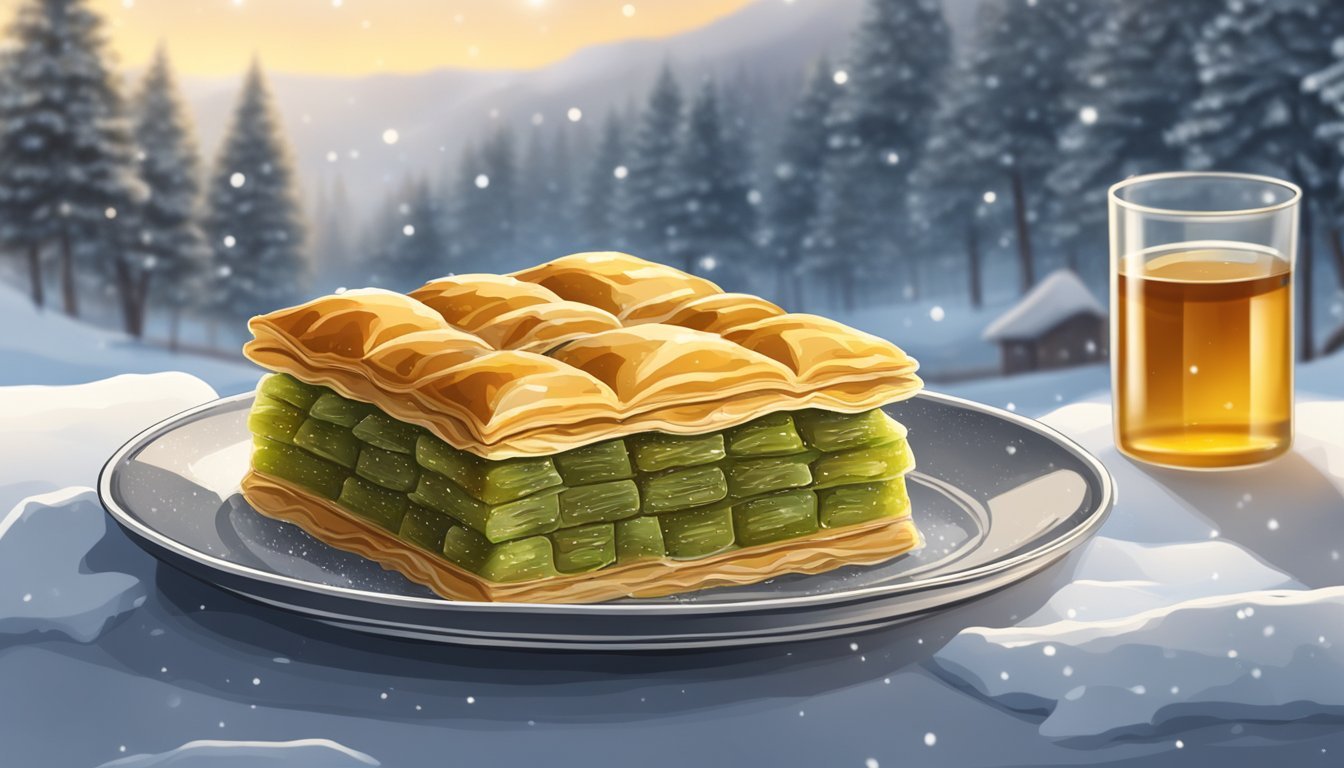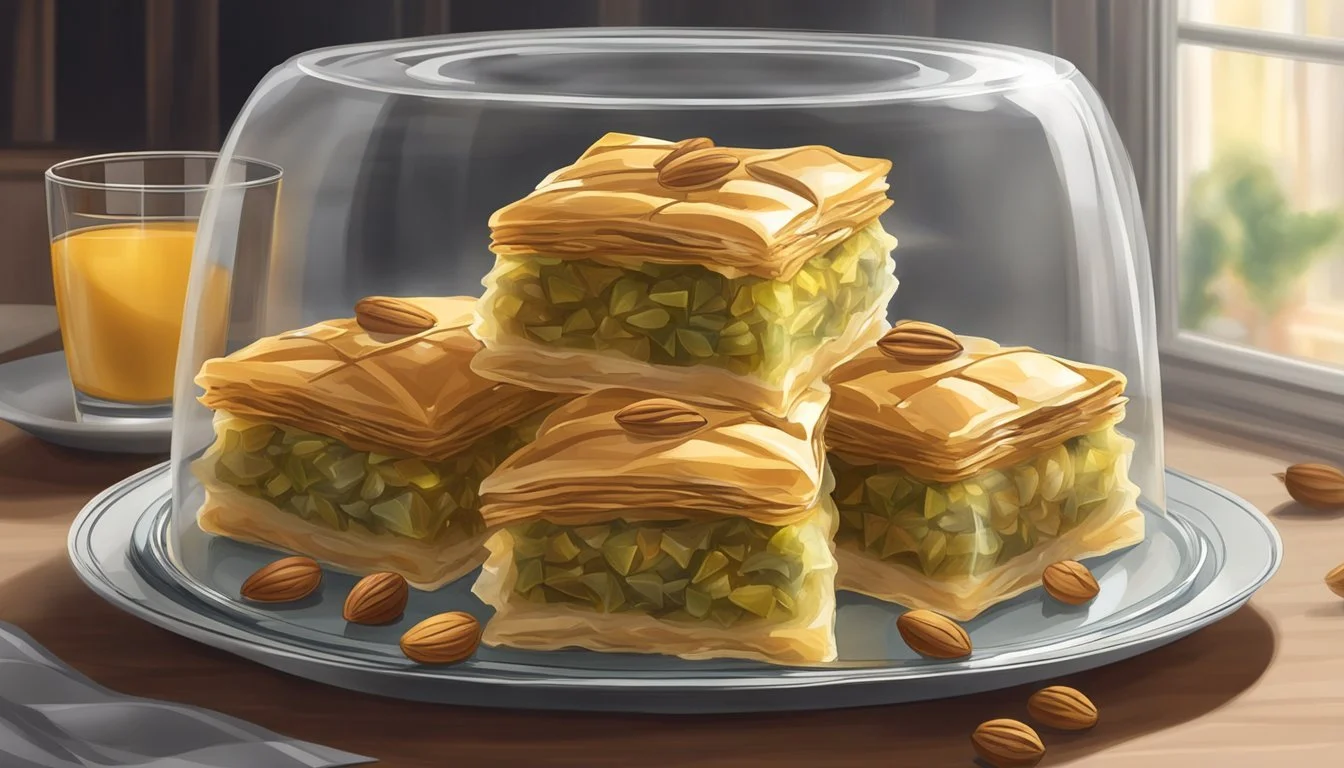How Long Does Freshly Prepared Baklava Last?
Shelf Life and Storage Tips
Baklava, a rich, sweet pastry made of layers of filo filled with chopped nuts and sweetened with syrup or honey, is a delicacy enjoyed by many around the world. Its shelf life is influenced by various factors, including the ingredients used, the environment in which it is stored, and the method of preparation. Freshly prepared baklava can last quite well under the right conditions, making it a treat that can be savored over time.
When stored properly, freshly made baklava typically retains its quality for about one to two weeks at room temperature. The key to ensuring its longevity is to keep it in an airtight container, which helps maintain its moisture and prevents it from becoming stale. If refrigeration is chosen as the storing method, baklava can last even longer while maintaining its taste and texture.
While it's possible to freeze baklava, doing so may alter its texture upon thawing. However, freezing can considerably extend its shelf life, making it a viable option for those who wish to keep baklava for extended periods. Once thawed, the pastry should be consumed within a short time to enjoy its optimal flavor and consistency.
Understanding Baklava
Baklava is a traditional dessert hailed from the Middle East and perfected during the Ottoman Empire era. It is crafted using layers of filo (or phyllo) dough, known for its thin, flaky texture. Each sheet of filo is meticulously brushed with melted butter, contributing to the pastry's rich flavor and golden color once baked.
At the heart of baklava lies its filling: a generous mixture of chopped nuts. Common choices include pistachios, walnuts, and occasionally almonds, which are often combined with sugar and cinnamon to enhance the taste profile.
Post-baking, baklava is traditionally immersed in a sweet syrup or honey-based solution, which may be flavored with lemon juice to introduce a subtle tanginess. This soaking process not only adds sweetness but also creates a moist interior and a longer-lasting freshness.
It's important to note that the quality of baklava can be impacted by the ingredients' quality, the preparation method, and the baking technique employed. Connoisseurs can often discern the expertise behind baklava preparation through its balanced sweetness, the crunchiness of the nuts, and the overall structural integrity of the layered pastry.
Freshness and Quality Factors
Maintaining the quality and freshness of baklava is tied closely to its ingredients, storage, and handling. Ensuring peak deliciousness requires strict attention to these factors.
Importance of Ingredients
Using fresh, high-quality ingredients is crucial for premium baklava. Quality nuts like walnuts or almonds, and real butter, contribute to the crispiness and flavor that distinguish authentic baklava. Fresh ingredients ensure a longer shelf life and optimal texture.
Texture and Flavor Preservation
Baklava's allure lies in its perfect balance between a crispy texture and rich flavor. Premium baklava, such as Cerez Pazari or assorted baklava that is halal or kosher, retains these qualities when ingredients are fresh, and the baklava is properly stored to prevent a soggy texture.
Impact of Storage Conditions
Storage is paramount; baklava must be kept in an airtight container to guard against moisture and air. Storing at a constant, cool temperature away from heat and light preserves its chewy and crispy texture, while humidity must be avoided to prevent spoilage.
Storage Location Expected Shelf Life Pantry Up to 2 weeks Refrigerator Up to 1 month Freezer Up to 4 months
Signs of Spoilage
Baklava showing any discoloration, unpleasant smell, or evidence of mold must be discarded. Stale taste or a chewy texture replacing the expected crispy-crunchy layers are signals that the baklava is no longer fresh.
Optimal Consumption Period
To enjoy baklava at its best, consume it within the first week after preparation. This ensures the flavors are rich, and the texture remains crispy on the outside and tender on the inside.
Reheating Techniques
To retain baklava's crispiness when reheating leftovers, place slices in a preheated oven at 350 degrees Fahrenheit for a few minutes until warm. This technique helps restore the just-baked quality.
Handling Leftovers
Leftover baklava must be tightly wrapped or returned to an airtight container immediately after serving. This prevents the intake of moisture and air, crucial in sustaining the baklava's texture and extending its shelf life.
Storing Baklava at Room Temperature
Storing baklava correctly at room temperature is essential for preserving its quality and extending its shelf life. The key factors to focus on are the timeframe for storage and the methods used to protect the dessert from air exposure.
Recommended Timeframe
When stored at room temperature, the ideal timeframe for keeping baklava fresh is up to 4 days. The temperature should be consistent, ideally between 50-70 degrees Fahrenheit (10-21 Celsius), which helps maintain the texture and flavor of the baklava without compromising its delicate layers.
Protection from Air Exposure
To prevent baklava from drying out or becoming stale, one must protect it from air exposure. First, it should be placed in an airtight container or a tin that limits airflow. For additional protection, it's advisable to:
Wrap the baklava: Using plastic wrap can help preserve the moisture. Baklava can be wrapped snugly in plastic wrap before placing it inside the container.
Layer with parchment paper: Placing a sheet of parchment paper between the layers of baklava can prevent sticking and preserve the pastry layers.
Using these storage methods helps to maintain the desired texture and taste during the storage period at room temperature.
Refrigerating Baklava
Proper refrigeration extends the shelf life of baklava while preserving its flavor and texture. To maintain quality, specific temperature settings must be adhered to, and the correct type of container must be used for storage.
Duration and Temperature Settings
Baklava should be stored in a refrigerator set to a temperature of 40°F (4°C) or below, which can be verified with a food thermometer. Under these conditions, baklava can typically last for up to 2 weeks. Keeping baklava cool helps prevent the growth of bacteria and preserves its texture and flavor.
Optimal Temperature: Below 40°F (4°C)
Expected Shelf Life: Up to 2 weeks
Maintain a consistent temperature to prevent spoilage.
Container Selection
To store baklava in the refrigerator:
Choose airtight containers to preserve freshness and prevent moisture ingress.
Alternatively, tightly wrap the baklava with plastic wrap or place it in an airtight plastic bag to protect against odors and prevent condensation.
Airtight Containers: Prevents moisture and preserves flavor.
Plastic Wrap or Bags: Shields from external odors; helps prevent condensation buildup.
Using containers that minimize exposure to air and moisture, one can prevent the baklava from becoming soggy. Additionally, it's important to allow the baklava to cool completely before refrigerating to prevent excess moisture from causing sogginess.
Freezing and Thawing Baklava
Proper freezing and thawing techniques are crucial to maintaining the flavor and texture of baklava. When done correctly, it allows one to preserve the dessert's crispiness and extend its shelf life significantly.
Freezing Guidelines
To freeze baklava, it's essential to let the dessert cool completely to prevent condensation that can lead to sogginess. Once cool, one should wrap the baklava snugly, first with plastic wrap to protect against moisture, and then with aluminum foil to guard against other freezer odors. For best results, place the wrapped baklava in an airtight container or a freezer-safe bag to help retain the baklava's freshness. This method helps to keep the pastry crunchy and prevent it from drying out. Baklava can be stored in the freezer for up to 4 months.
Cool down: Ensure baklava is at room temperature.
Wrap in plastic: Seal tightly with plastic wrap.
Additional foil layer: Wrap in aluminum foil.
Airtight storage: Store in airtight container or freezer-safe bag.
Freezing time: Good for up to 4 months.
Thawing Process
The thawing of baklava should be a gradual process to maintain its optimal texture and flavor. One should remove the baklava from the freezer and place it in the refrigerator for several hours to thaw slowly. It's essential to keep the baklava in its wraps while thawing to prevent moisture from seeping in. Once thawed, the baklava can be gently warmed in the oven if a crispier texture is preferred.
Refrigerate: Thaw in refrigerator while still wrapped.
Room temperature: Let sit at room temperature if needed.
Optional warming: Briefly warm in oven for crispiness.
Quality After Freezing
Freezing can affect the texture and flavor of baklava, but if one follows the correct freezing and thawing guidelines, the quality should not be significantly compromised. The baklava should retain its distinct syrupy juice, flavor, and crispiness. However, the texture may be slightly less crunchy than freshly baked baklava.
Texture: Slightly less crunchy but should remain crisp.
Flavor: Maintains rich, sweet flavor and syrupy quality.
Freshness: Properly wrapped and frozen baklava still tastes fresh.
Making Baklava Last Longer
Effective strategies for extending the shelf life of baklava focus on proper cooling and handling, secure packaging, and the use of preservatives to maintain the quality and flavor.
Cooling and Handling Post-Baking
After baklava has finished baking, it is crucial to allow it to cool completely at room temperature before storing to prevent it from becoming soggy. The baklava should sit cool in the baking pan until the sugar or honey syrup that was poured over it has been fully absorbed and the layers have settled.
Packaging for Extended Shelf Life
Storing baklava properly is essential to extend its shelf life. Baklava should be placed in an airtight container to shield it from air and moisture. For added protection, each piece can be wrapped in plastic wrap or aluminum foil before placing in the container. The sealed container keeps the baklava fresh and flavorful.
At room temperature: Baklava can last up to 1 week.
Refrigerated: The shelf life extends to approximately 2 weeks.
Frozen: Properly packaged, baklava can last up to 4 months.
Usage of Preservatives
Although traditional recipes may not call for them, adding preservatives can further prolong shelf life. Natural preservatives, such as ascorbic acid, can be used to maintain freshness without altering the taste significantly. Care should be taken to ensure any added preservatives are compatible with the baklava's flavor profile.
FAQs
Baklava lovers often have questions about the best ways to store and preserve the quality of this sweet delicacy. This section addresses common concerns including storage options, signs of spoilage, reheating techniques, and the feasibility of freezing baklava drenched in syrup.
Can I Store Baklava Without Refrigeration?
Yes, baklava can be stored at room temperature in a cool, dry place. To maintain its crispiness and prevent spoilage, baklava should be kept in an airtight container, which can preserve it for up to one week. Exposure to air and moisture should be minimized to maintain freshness.
How to Know When Baklava Goes Bad?
Baklava is considered bad when it shows signs of mold or has a noticeable off-smell indicating spoilage. If the pastry becomes overly soggy or the texture changes significantly, it is best to discard it to avoid any foodborne illnesses.
Best Methods to Reheat Baklava
To retain the crispiness of baklava when reheating, it's advisable to use an oven. Preheat the oven to a low temperature and place the baklava for a short period until it is warm throughout. Microwaving is not recommended as it can cause the pastry to become soft and lose its desired texture.
Is It Safe to Freeze Baklava with Syrup?
Baklava can be frozen even after it is soaked in honey or sugar syrup. To freeze, ensure that the baklava cools down completely, then wrap it tightly in plastic wrap, followed by aluminum foil or place it in an airtight container. Properly stored, baklava can be frozen for up to four months without significant loss of quality. Thaw in the refrigerator slowly to maintain the syrup's texture and prevent the pastry from becoming too moist.








